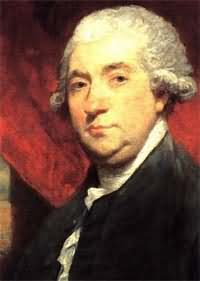Boswell's Life of Boswell

James Boswell was the original groupie, in the modern sense; but, in the 18th century, there were no rock stars, so if your psychological make-up demanded of you that you adopt the shape of a groupie, you attached yourself to literary celebrities. Since nearly all literary celebrities in the 18th century were men, if you were a heterosexual male groupie, you could not avail yourself of one of the great benefits of being a groupie; Boswell worked this out by sleeping with anything with a pulse wearing petticoats.
Boswell was born on this day in 1740 in Edinburgh. His father was a high court judge, and although it was expected that Boswell would follow in the ancestral profession, the Scottish Bar, Boswell did everything he could think of to avoid his studies, principally scribbling verses and chasing after actresses. In 1760 Boswell ran away from the law, at least temporarily, and took up residence in London for 3 months, flirting briefly with Roman Catholicism but dropping it as it got in the way of his increasingly daring sexual adventuring.
During his stay, he caught the buzz of "the great, the gay and the ingenious," hanging with the likes of Laurence Sterne and Edward Augustus, the Duke of York (the future George III's younger brother), a period that marked the beginning of his celebrity addiction. Yanked back to Edinburgh, he studied law listlessly and pressed his case with his father for getting an officer's commission in the Footguards so that he could stay in London. His father, fearing the boy was destined to be perennially irresponsible, hooked him into a trusteeship with a meager allowance and blackmailed him into finishing his course in law, which he did, even as he indulged his taste for London and its literary lights.
In 1763, Boswell met Dr. Samuel Johnson, London's leading literary light, in a Covent Garden bookshop and apologized to him for being Scottish; Johnson replied that it was a fault Boswell shared with many of his countrymen. Soon Boswell became Johnson's charming if imperfect little brother, walking beside the big man and jotting down notes of all of their conversations.
Boswell went to Utrecht the following year, ostensibly to continue his legal studies, but Utrecht became his home-base for European gatecrashing; his great cajones got him into the damnedest interviews with such giants as Voltaire and Rousseau. Rousseau inspired him to go to Corsica to witness its ill-fated revolution against Genoa, which formed the basis for Boswell's first literary success, An Account of Corsica (1768).
Meanwhile, he entered the Scottish Bar in 1766, entered the practice of law (after a fashion), and despite the allure of numerous affairs (including an episode with Rousseau's own mistress), married his cousin Margaret Montgomerie, a woman who ultimately seemed capable of putting up with Boswell's lack of self-control. He was elected to The Literary Club in 1773, a collection of Johnson's witty pals which included playwright Oliver Goldsmith and the actor-impresario David Garrick, and shortly thereafter took Johnson on a tour of the Hebrides, to be recounted in Boswell's Journal of a Tour to the Hebrides with Samuel Johnson (1785).
Between 1777 and 1783, Boswell wrote 70 articles for the London Magazine under the self-conscious pseudonym "the Hypochondriak" (a blogger before there were bloggers, if you will); after the publication of the Hebrides journal, however, Boswell's most famous work, the Life of Johnson (1791) was his central preoccupation. With the death of his wife in 1789 and the Life under his belt, drinking withered him in his last years, and he died in 1795.
While the Life was celebrated for its lively detail, it didn't necessarily elevate Boswell to the pantheon of major talents; that status would wait until the 1920s, when his copious, daringly confessional journals from his early visits to London (London Journal, 1762-63) were found in an ancestral trunk and published. In them, he shows a precocious understanding of human motive, his own and those of others, which would infect his later journalism, and reveals his own flaws with captivating detachment -- a most modern tell-all 300 years ahead of its time.
Labels: Literature





0 Comments:
Post a Comment
Subscribe to Post Comments [Atom]
<< Home